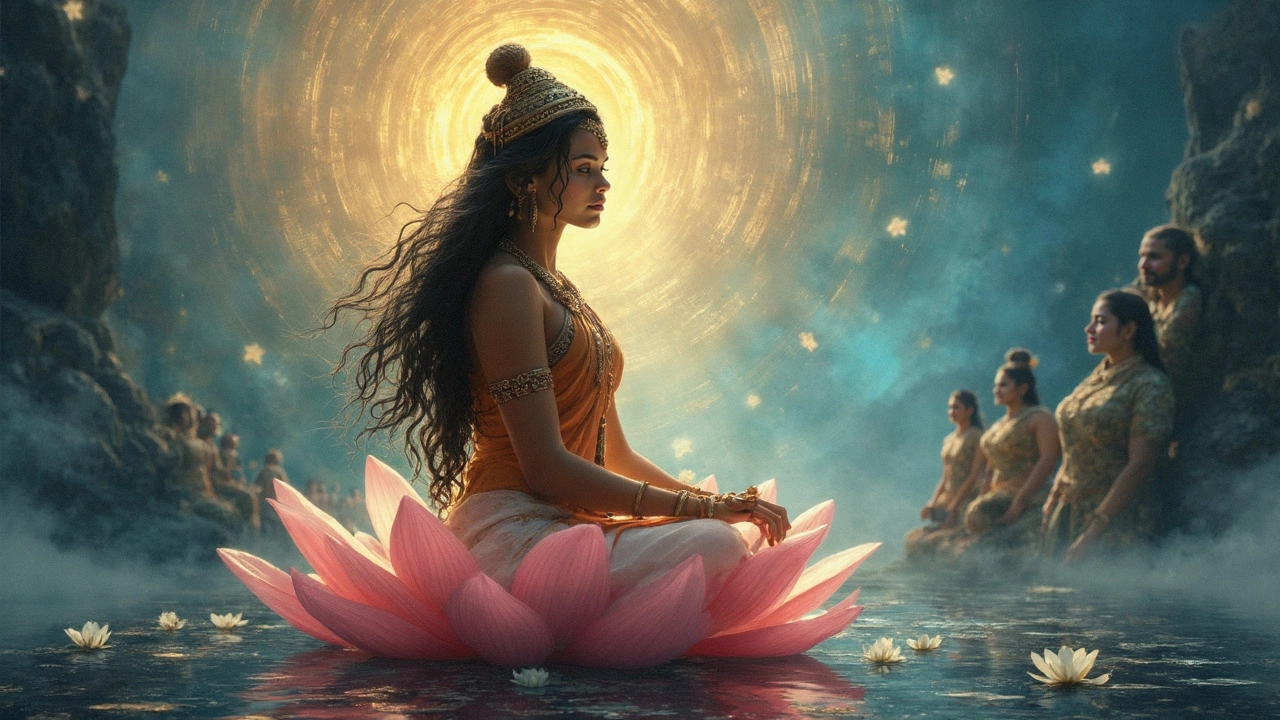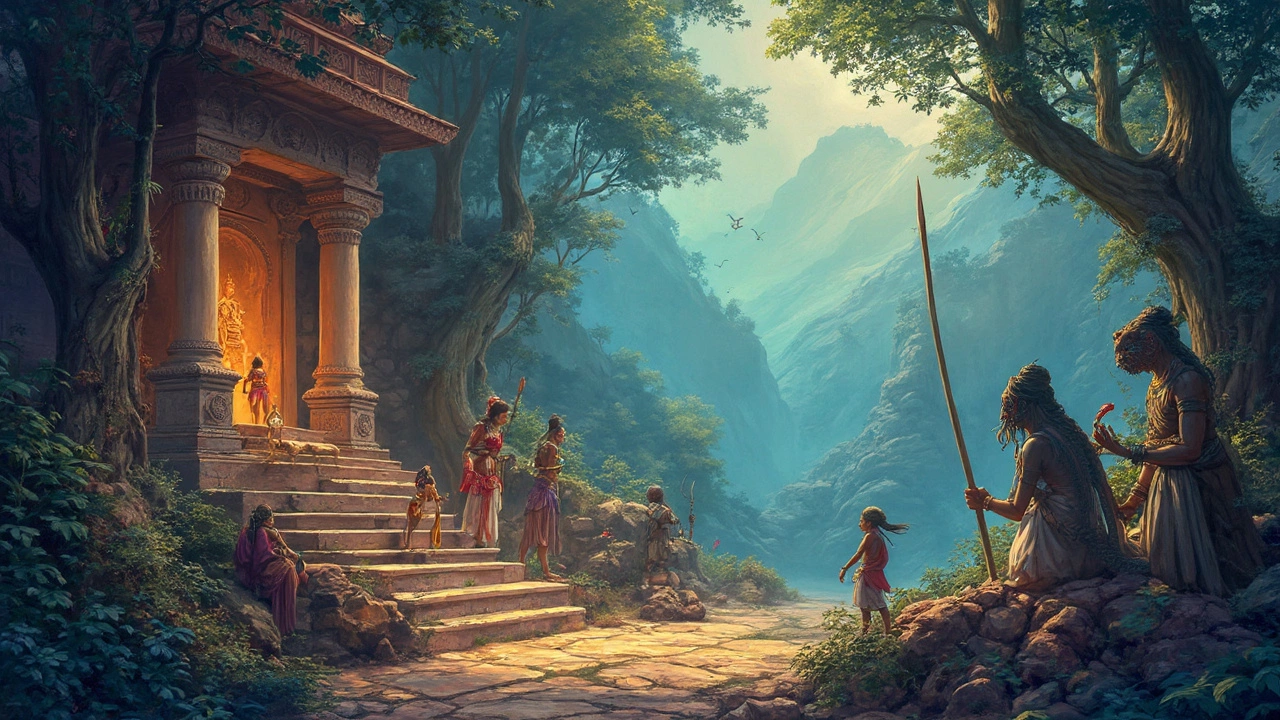Indian mythology is like a box of never-ending stories, packed with fascinating characters and gripping tales. Imagine having a new story every day for a year—that's what the '365 Tales of Indian Mythology' offers! It's like a mythical calendar that takes you on a daily adventure through the magical landscapes of old.
These stories are more than just bedtime tales; they're little gems of wisdom, brimming with cultural insights and moral lessons. You'll find everything from epic battles between gods and demons to charming tales of animals teaching us life lessons. It’s not just the popular stories we all know; you’ll stumble upon lesser-known gems that give fresh perspectives on the vast universe of Indian myths.
If you're curious about the ancient Indian culture or simply love a good story, this collection is a brilliant way to dive deeper. It’s fascinating how these ancient stories still find relevance today, helping us navigate modern life with age-old wisdom. So, whether you're a mythology buff or a curious soul, these tales add a splash of magic and meaning to everyday life.
- Overview of 365 Tales Collection
- Significance of the Stories
- Popular and Lesser-Known Myths
- Cultural Lessons and Themes
Overview of 365 Tales Collection
Diving into the '365 Tales of Indian Mythology', it’s a bit like having a magical encyclopedia at your fingertips. This collection isn’t just randomly thrown together; it's carefully curated to bring out the richness of Indian mythology in a way that feels fresh and engaging. It’s built on the idea that for each day of the year, you get to experience a different story which reveals something about the culture, ethos, and spirituality of India.
Each tale is selected to offer a snippet of an era gone by, pulling from a wide range of sources like the Vedas, the Mahabharata, the Ramayana, and regional folklore. The collection not only showcases the well-known heroes like Rama and Krishna but also shines a light on lesser-known deities and local tales that are equally compelling. It’s like having a backstage pass to the lesser-discussed parts of these grand epics.
A cool feature of this compilation is how it balances the famous narratives with hidden gems, bringing variety to the reader. By presenting both popular and obscure stories, it keeps you guessing and wanting more each day. Plus, every story is crafted to be concise yet impactful, so you can soak in their essence without feeling like you're back in history class.
The '365 Tales' isn’t just a book—it's a journey through time, offering a peek into India’s vibrant past where mythical and real worlds often intertwined. Whether you're a mythology fanatic or just someone looking for a daily splash of inspiration, this collection is designed to keep your curiosity sparked and your sense of wonder alive.
Significance of the Stories
The '365 Tales of Indian Mythology' isn’t just a collection of fun stories to read and forget. These tales hold deeper meanings and cultural significance. Each one reflects the values, beliefs, and the moral fabric of ancient Indian mythology that have shaped Indian culture over centuries.
What makes these stories stand out is their ability to convey profound lessons in simple narratives. Take the story of 'The Churning of the Ocean' or Samudra Manthan. It's not just about gods and demons trying to churn the ocean; it illustrates the eternal struggle between good and evil, the importance of patience, and the rewards of perseverance. Lord Vishnu's role in these tales often symbolizes the preservation of Dharma, a core belief in Indian culture.
“These myths are mirrors reflecting our moral dilemmas and the complexities of the human condition,” says Dr. Rajesh Rao, a well-known scholar on Indian mythology.
The mythology stories also explain natural phenomena and seasonal changes. For instance, the legend of Holika Dahan signifies the victory of good over evil and is celebrated as the festival of Holi.
Moreover, these tales serve as essential tools for passing down history and cultural heritage through generations. They're like cultural bridges connecting the past with the present, allowing us to understand the evolution of societal norms and values.
| Aspect | Significance |
|---|---|
| Moral Values | Instills virtues and ethics |
| Cultural Insights | Preserves traditional beliefs |
| Education | Teaches historical events |
So, next time you flip through one of these tales, remember it's more than entertainment—it's a slice of Indian heritage that continues to influence and inspire lives even today.

Popular and Lesser-Known Myths
Dive into the world of Indian mythology, and you'll meet a whole cast of epic heroes and magical beings. Everyone knows the big ones like the Mahabharata and the Ramayana. The Mahabharata, with its intense Kurukshetra war, shows the complex play of karma and dharma, bringing us characters like Arjuna and Krishna, whose teachings in the Bhagavad Gita continue to guide people.
Now, while these stories capture a lot of spotlight, there's a treasure trove of lesser-known myths that are just as fascinating. Let's talk about Savitri and Satyavan—a beautiful myth about a devoted wife's love. When Savitri outwits Yama, the god of death, to bring her husband back to life, it showcases determination and the strength of love.
Then there's the tale of Ganesha and the moon. One night, Ganesha fell off his mount—a mouse—and in laughter, the moon mocked him. Feeling offended, Ganesha cursed the moon, leading to the belief that looking at the moon on Ganesh Chaturthi brings bad luck. These stories might not headline the mythology bestsellers, but they hold quirky charm and valuable lessons.
Each of these stories, known or hidden away in the vastness of Indian lore, teaches something—whether it's about righteousness, courage, or humility. They are a reminder of the deep cultural roots and moral fibers that thread through the rich tapestry of myths. Reading them feels like having little chats with ancient wisdom passed down over centuries.
Cultural Lessons and Themes
Diving into the 365 tales of Indian mythology is like getting a daily dose of wisdom wrapped in an entertaining package. Each story is a reflection of the values and morals that have shaped Indian society for centuries. One striking feature is the emphasis on dharma, or duty, which is a recurring theme in many tales. It's all about doing the right thing, whether you're a mighty prince or a humble villager.
A classic example is the epic Mahabharata tale, where the character Yudhishthira embodies righteousness above all else, teaching us the importance of integrity. Another theme that stands out is karma—the idea that every action has consequences. This concept is beautifully illustrated in the stories of Lord Vishnu, who appears in different avatars to restore moral order, reinforcing the cycle of action and consequence.
You also find lessons on the balance of power and humility, as seen in tales like the story of Lord Rama, who despite being a powerful deity, lives life with modesty and kindness. These stories are not just about gods and demons; they're mirrors reflecting human traits, like our strengths, weaknesses, and everything in between.
Moreover, Indian mythology often highlights the interconnectedness of nature and life. Many stories feature animals and natural elements, emphasizing respect and harmony with our environment. The story of King Shibi, who sacrifices himself to save a dove, underscores the value of compassion and selflessness.
For those curious about how these ancient stories relate to modern life, they provide timeless advice on personal growth and societal harmony. They remind us of the importance of Indian culture, helping us understand our place in the world by learning from the past. So while these tales entertain, they also educate, ensuring that the lessons learned are as applicable today as they were centuries ago.
